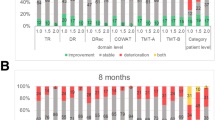Abstract
This study evaluated the mini-mental status examination (MMSE) scores of patients with brain metastases after gamma knife radiosurgery (GKS) without whole-brain radiation therapy (WBRT). Between January 2009 and June 2011, 119 consecutive patients with new brain metastases were treated with a single session of GKS without WBRT. MMSE scores were determined for all patients before GKS and for surviving patients every 3 months after GKS. We evaluated 76 patients (63.9 %) after GKS. The median pre-GKS MMSE score was 28 (range 3–30). The median age, number of brain metastases, and total volume of brain metastases were 65.5 years (range 40–92 years), 2 (range 1–18), and 4.17 ml (range 0.04–27.0 ml), respectively. The median marginal dose was 22.0 Gy (range 14–24 Gy). Thirty-nine patients (51.3 %) developed new distant lesions. The median MMSE follow-up time was 5.8 months (range 0.9–21.6 months). In 16 of 37 patients (43.2 %) with pre-GKS MMSE scores ≤27, the MMSE scores improved by ≥3 points, whereas 15 of all patients (19.7 %) experienced deteriorations of ≥3 points. The incidences of 3-point drops due to new distant lesions and adverse radiation effects were 2.6 and 1.3 %, respectively. The 12-month rate of 3-point drops of the MMSE score due to these 2 causes was 4.2 % (1 of 24 patients). A larger tumor volume was a better prognostic factor for an improvement. GKS has a mild effect on neurocognitive function. Mental deterioration of patients with large symptomatic metastatic tumors tended to improve after GKS.

Similar content being viewed by others
References
Aoyama H, Shirato H, Tago M et al (2006) Stereotactic radiosurgery plus whole-brain radiation therapy vs stereotactic radiosurgery alone for treatment of brain metastases: a randomized controlled trial. J Am Med Assoc 295:2483–2491
Chang EL, Wefel JS, Hess KR et al (2009) Neurocognition in patients with brain metastases treated with radiosurgery or radiosurgery plus whole-brain irradiation: a randomised controlled trial. Lancet Oncol 10:1037–1044
Kocher M, Soffietti R, Abacioglu U et al (2011) Adjuvant whole-brain radiotherapy versus observation after radiosurgery or surgical resection of one to three cerebral metastases: results of the EORTC 22952-26001 study. J Clin Oncol 29:134–141
Serizawa T, Yamamoto M, Sato Y et al (2010) Gamma Knife surgery as sole treatment for multiple brain metastases: 2-center retrospective review of 1508 cases meeting the inclusion criteria of the JLGK0901 multi-institutional prospective study. J Neurosurg 113(Suppl):48–52
Yamamoto M, Ide M, Nishio S, Urakawa Y (2002) Gamma Knife radiosurgery for numerous brain metastases: is this a safe treatment? Int J Radiat Oncol Biol Phys 53:1279–1283
Soffietti R, Rudà R, Trevisan E (2008) Brain metastases: current management and new developments. Curr Opin Oncol 20:676–684
Welzel G, Fleckenstein K, Schaefer J et al (2008) Memory function before and after whole brain radiotherapy in patients with and without brain metastases. Int J Radiat Oncol Biol Phys 72:1311–1318
Aoyama H, Tago M, Kato N et al (2007) Neurocognitive function of patients with brain metastasis who received either whole brain radiotherapy plus stereotactic radiosurgery or radiosurgery alone. Int J Radiat Oncol Biol Phys 68:1388–1395
Crum RM, Anthony JC, Basset SS, Folstein MF (1993) Population-based norms for the Mini-Mental State Examination by age and educational level. J Am Med Assoc 269:2386–2391
Regine WF, Huhn JL, Patchell RA et al (2002) Risk of symptomatic brain tumor recurrence and neurologic deficit after radiosurgery alone in patients with newly diagnosed brain metastases: results and implications. Int J Radiat Oncol Biol Phys 52:333–338
Shibamoto Y, Baba F, Oda K et al (2008) Incidence of brain atrophy and decline in mini-mental state examination score after whole-brain radiotherapy in patients with brain metastases: a prospective study. Int J Radiat Oncol Biol Phys 72:1168–1173
Regine WF, Scott C, Murray K, Curran W (2001) Neurocognitive outcome in brain metastases patients treated with accelerated-fractionation vs. accelerated-hyperfractionated radiotherapy: an analysis from Radiation Therapy Oncology Group Study 91-04. Int J Radiat Oncol Biol Phys 51:711–717
Fujii O, Tsujino K, Soejima T, Yoden E, Ichimiya Y, Sugimura K (2006) White matter changes on magnetic resonance imaging following whole-brain radiotherapy for brain metastases. Radiat Med 24:345–350
Sawrie SM, Guthrie BL, Spencer SA et al (2008) Predictors of distant brain recurrence for patients with newly diagnosed brain metastases treated with stereotactic radiosurgery alone. Int J Radiat Oncol Biol Phys 70:181–186
Sheehan JP, Yen CP, Nguyen J, Rainey JA, Dassoulas K, Schlesinger DJ (2011) Timing and risk factors for new brain metastasis formation in patients initially treated only with Gamma Knife surgery. J Neurosurg 114:763–768
Serizawa T, Higuchi Y, Ono J et al (2006) Gamma Knife surgery for metastatic brain tumors without prophylactic whole-brain radiotherapy: results in 1000 consecutive cases. J Neurosurg (Suppl) 105:86–90
Ishikawa E, Yamamoto M, Saito A et al (2009) Delayed cyst formation after gamma knife radiosurgery for brain metastases. Neurosurgery 65:689–695
Disclosure
Dr. Nakazaki declares no actual or potential conflicts of interest.
Funding
Dr. Kano is funded by a research Grant from Elekta AB, Stockholm, Sweden.
Author information
Authors and Affiliations
Corresponding author
Rights and permissions
About this article
Cite this article
Nakazaki, K., Kano, H. Evaluation of mini-mental status examination score after gamma knife radiosurgery as the first radiation treatment for brain metastases. J Neurooncol 112, 421–425 (2013). https://doi.org/10.1007/s11060-013-1071-0
Received:
Accepted:
Published:
Issue Date:
DOI: https://doi.org/10.1007/s11060-013-1071-0




